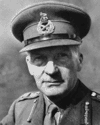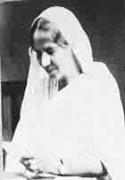|
|
||||||||||||||||||||||||
 |
Featured person
Recently added |
Sir John Greer Dill (1881 - 1944): |
||||||||||||||||||||||

|
Dill was born in Lurgan on 25 December 1881, son of the local bank manager. He attended Cheltenham College and the Royal Military College at Sandhurst. In 1901 he joined the 1st battalion of the Leinster regiment and saw action in the Second Boer War. On the outbreak of the World War I he became brigade-major of the 25th brigade (8th division) in France where he was present at Neuve Chapelle, Alvers Ridge and Bois Grenier. By the end of the war he was a brigadier general, had been wounded in action and mentioned in despatches eight times.
After the war he gained a reputation as a gifted army instructor. He was promoted to major general in 1930, taking up appointments at the Staff College and then in the War Office. Dill commanded British forces in Palestine (1936 - 1937). He was commander of I Corps in France (1939-40), returning to the UK in April 1940 when he was appointed Vice Chief of the Imperial General Staff by the then Prime Minister Neville Chamberlain.
In May 1940, after Churchill had replaced Chamberlain, Dill was appointed as CIGS. Later in 1940, he became ADC General to King George VI. By the time Churchill worked with Dill as Chief of the Imperial General Staff it was clear how poorly the two men got on. Dill gained a reputation as obstructive and unimaginative. To get him out of the way, Churchill posted him to Washington as his personal representative in 1941 where he became Chief of the British Joint Staff Mission, then Senior British Representative on the Combined Chiefs of Staff. In Washington Dill found his feet, excelling as a diplomatic military presence. In 1943 alone he attended the Conferences in Quebec, Casablanca and Tehran, and also meetings in India, China and Brazil. He served briefly on the combined policy committee set up by the British and United States governments under the Quebec Agreement to oversee the construction of the atomic bomb. He was immensely important in making the Chiefs of Staff committee - which included members from both countries - function, often smoothing ruffled feathers in the clash of cultures that followed.
Dill was particularly friendly with General George Marshall (he of the Marshall Plan) and the two exercised a great deal of influence on President Roosevelt who described Dill as "the most important figure in the remarkable accord that has been developed in the combined operations of our two countries". Dill served in Washington until his death in November 1944. Following a memorial service in Washington Cathedral he was buried in Arlington National Cemetery. He was posthumously awarded an American Distinguished Service Medal in 1945 as well as receiving an unprecedented joint resolution of Congress appreciating his services.
An equestrian statue in his honour was unveiled by President Harry S Truman in Arlington National Cemetery in November 1950.
| Born: | 25 December 1881 |
| Died: | 4 November 1944 |
| Patrick Devlin |


Home | Our Policies | Plaques | Browse | Search | Sponsors | Links | Help | Contact
Privacy & Disclaimer | Cookie Policy | Site Map | Website Design By K-Point
© 2024 Ulster History Circle









